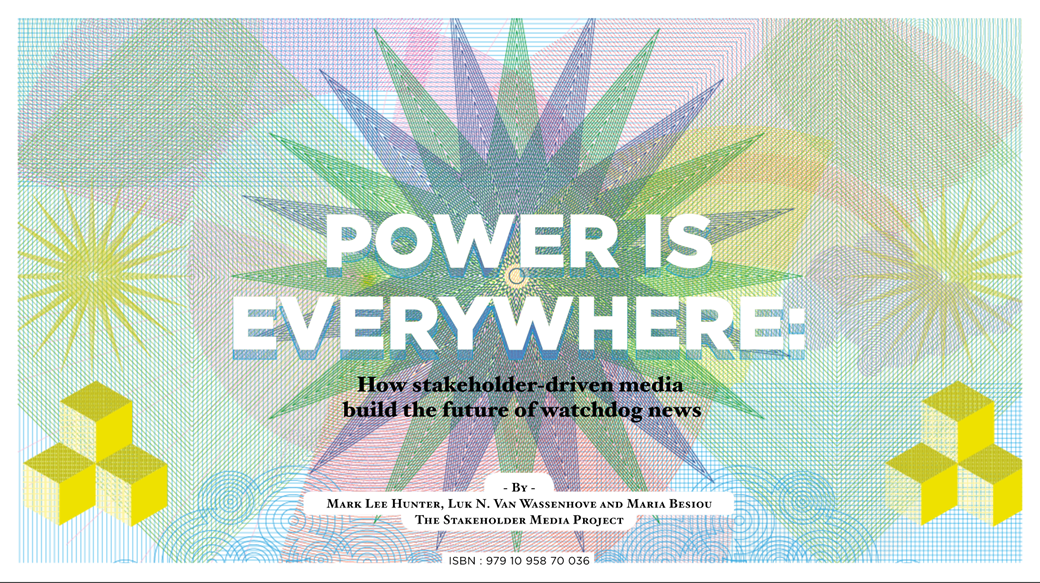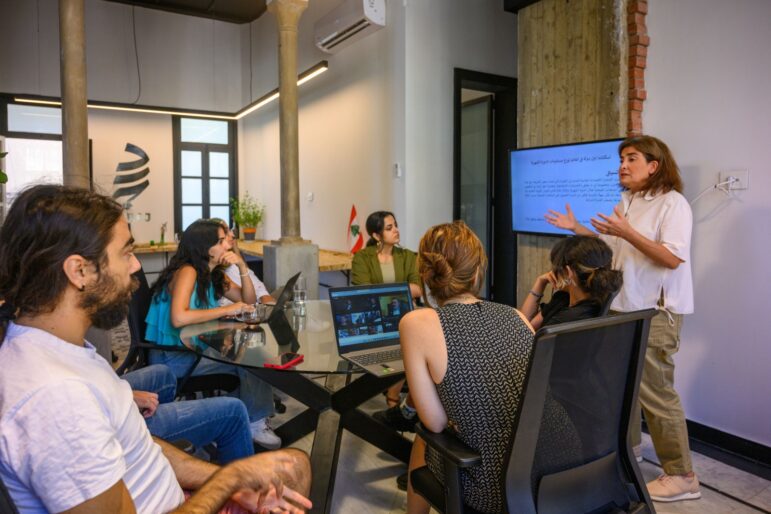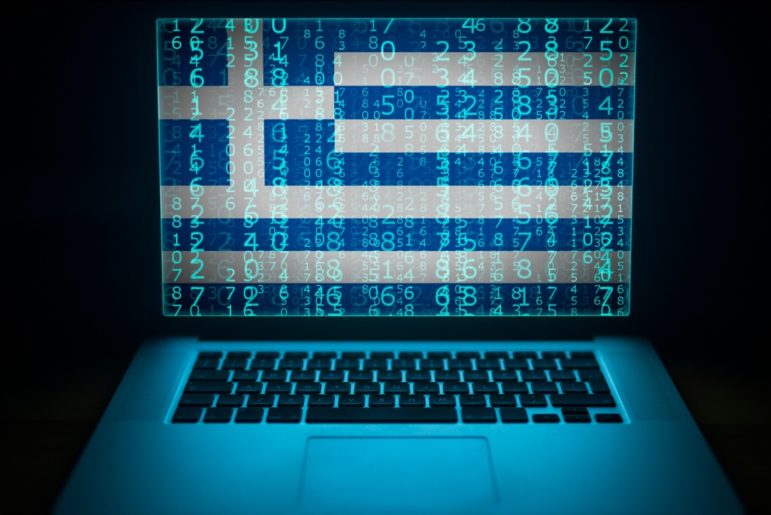

How New Media’s Social Impact Creates Financial Value
Lately I have been reading a lot about a new way of valuing media that would benefit entrepreneurial journalism ventures, which nearly always lack capital to launch and sustain themselves.
 Sociologists and economists have been writing about it for years — social capital — and I am embarrassed to say that I have just started learning about it.
Sociologists and economists have been writing about it for years — social capital — and I am embarrassed to say that I have just started learning about it.
Social capital is a value that media entrepreneurs possess through their ethnic, social, professional, and business networks. It is also a value that they create through their work’s impact on society.
Investors, the public, and the media entrepreneurs themselves have tended to undervalue their work because it is hard to place a value on their social capital. By contrast, it is easy to value a publication through the advertising and subscription revenue it generates and the capital assets it owns.
Cultural and social capital are “disguised forms of economic capital” and produce their effects by concealing the fact that economic capital is at their root, the French sociologist Pierre Bourdieu has written. The favors we do, the gifts we give, the friendships we cultivate, the relationships we make are all motivated, to some extent, by an expectation of gratitude or a returned favor.
The problem is that we don’t know what these favors are worth until we try to “activate” them by asking one of our connections or networks for help. And investing time and energy to generate social capital is a risky long-term proposition: our investments might not be appreciated or reciprocated by the other party. But when entrepreneurs activate their social capital they can create value that generates revenue and supports a free press.
 INSEAD’s recent book “Power Is Everywhere: How Stakeholder-Driven Media Build the Future of Watchdog News” contains many examples of how media around the world are activating their social capital. Among those profiled are some that I have also written about.
INSEAD’s recent book “Power Is Everywhere: How Stakeholder-Driven Media Build the Future of Watchdog News” contains many examples of how media around the world are activating their social capital. Among those profiled are some that I have also written about.
Mediapart, France
The French digital news startup Mediapart‘s five founders—well known journalists from the venerable publications Le Monde and Libération—activated their social networks in 2007 to disprove a widely held belief at the time, namely that people would not pay for online investigative journalism.
 When Mediapart launched in 2008, the founders had raised about $4 million in initial capital, $2 million of which was their own money. Two outside investors, Doxa and Ecofinance, each invested about $700,000. Another 40 friends and others invested between $7,000 and $70,000 each, for another $700,000 (see Wagemans et al. for a detailed description of the launch).
When Mediapart launched in 2008, the founders had raised about $4 million in initial capital, $2 million of which was their own money. Two outside investors, Doxa and Ecofinance, each invested about $700,000. Another 40 friends and others invested between $7,000 and $70,000 each, for another $700,000 (see Wagemans et al. for a detailed description of the launch).
The reputations of the founders and their networks were the social capital that attracted investment as well as a team of 25 reporters willing to take the risk on a venture many predicted would fail. The subscription-only digital publication has continued to grow and prosper.
De Correspondent, Holland
 De Correspondent, a Dutch-language online journalism platform that offers background, analysis, and investigative reporting, launched in the fall of 2013 after raising $1.7 million from 19,000 people in what was then a world record in crowd-funding for a media organization.
De Correspondent, a Dutch-language online journalism platform that offers background, analysis, and investigative reporting, launched in the fall of 2013 after raising $1.7 million from 19,000 people in what was then a world record in crowd-funding for a media organization.
Again, its founders were well-known journalists. Their value proposition was that they would deliver in-depth reporting, news analysis unconnected to political ideology, and no advertising in order to maintain editorial independence. It now has more than 50,000 subscribers.
Editor Ernst-Jan Pfauth said one of the secrets for activating this network of Dutch citizens was to start a movement, not a publication. “We told our audience that we wanted to start a publication that would serve as their daily antidote to the hypes of the day. A publication that ignores what happens only today and focuses instead on the things that happen every day. We promised our readers that we’d help them understand the world around them better.”
Eldiario.es, Spain
This startup, like some other successful ones, had a charismatic founder who was the main activator of social capital — Ignacio Escolar. He had worked in television and as the founding editor of the daily newspaper El Público.
 Escolar and a handful of other independent-minded journalists left El Público and launched Eldiario.es in 2012 with $440,000. Escolar decided to start with a small staff and grow organically as revenue increased. Eldiario.es is owned by the journalists themselves, who have been re-investing any profits in growth and improvements.
Escolar and a handful of other independent-minded journalists left El Público and launched Eldiario.es in 2012 with $440,000. Escolar decided to start with a small staff and grow organically as revenue increased. Eldiario.es is owned by the journalists themselves, who have been re-investing any profits in growth and improvements.
Escolar has made financial transparency about ownership and finances a selling point and part of his strategy is to identify his brand with journalism that is independent from any political party or special interest.
Part of that differentiation is the publication’s program of raising money from its “socios” or partners. They pay $66 a year to get access to the news a few hours ahead of everyone else as well as ad-free pages, discounts, and invitations to events. “And they allow us to remain independent,” Escolar said.
Those partners, who totaled 19,200 in mid-2016, brought in about a third of Eldiario.es’s revenues. Although advertising brings in more than the partner revenue, no single advertiser comes close to bringing in what the partners do, so none has enough leverage to influence editorial decisions, he said. Journalism is not a business; it’s a public service, he says. “But it is a public service that has to be profitable”.
Social Impact as Capital
In recent years, a new type of investing has emerged called venture philanthropy or social impact investing, whose investors are concerned with not only economic returns but positive social impacts.
The Media Development Investment Fund, based in New York, makes investments in “independent media around the world providing the news, information, and debate that people need to build free, thriving societies”. In 20 years, the organization has provided $153 million in financing and professional consulting to more than 100 businesses in 39 countries.
MDIF has developed a dashboard for assessing impact. It measures its media investments on their sales, reach (users, readers, viewers, listeners), and financial viability (cash flow, assets, debt, growth, management), as well as the impact on holding authorities accountable and revealing corruption. And unlike an NGO or foundation, MDIF promises its investors a financial return.
It should also be noted that many of these media organizations are not primarily interested in delivering profits to shareholders but rather social benefits in the form of a free and independent press.
They measure their effectiveness by their impact on society through holding the powerful accountable, by encouraging democratic participation, and by informing their communities about vital issues. This is their strategy for attracting investors, sponsors, and subscribers. In this respect they are recognizing that the media industry is not just a source of profits.
For high-quality journalism to thrive after the collapse of the traditional business model for media, the economic value of social impact has to be used to justify and attract investments from foundations, NGOs, businesses, the public, and even government. In this new dynamic, media organizations will need to find ways to generate revenue and maintain their independence by keeping their funders at arm’s length.
This post originally appeared on the blog News Entrepreneurs. It is re-published with the author’s permission.
 James Breiner is a consultant and visiting professor at Spain’s University of Navarra. He is former director of the Global Business Journalism program at China’s Tsinghua University and founding director of the University of Guadalajara’s Center for Digital Journalism. @jamesbreiner
James Breiner is a consultant and visiting professor at Spain’s University of Navarra. He is former director of the Global Business Journalism program at China’s Tsinghua University and founding director of the University of Guadalajara’s Center for Digital Journalism. @jamesbreiner










